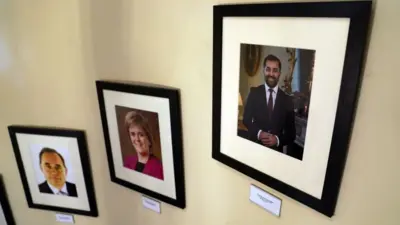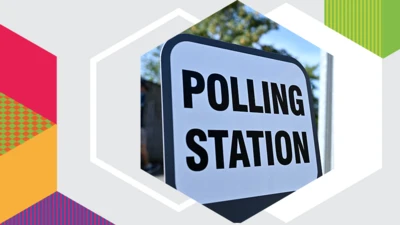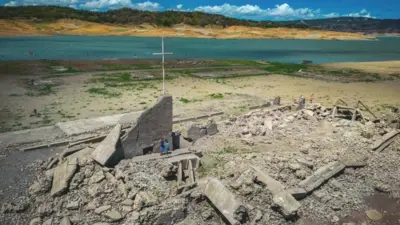We've updated our Privacy and Cookies Policy
We've made some important changes to our Privacy and Cookies Policy and we want you to know what this means for you and your data.
Richard Sharp: Johnson was told to stop asking for loan advice - report
- By Iain Watson, political correspondent & James FitzGerald
- BBC News
Links between Boris Johnson and BBC chairman Richard Sharp are under fresh scrutiny, following a report that the then-prime minister was told to stop asking Mr Sharp for financial advice.
Mr Sharp's appointment is under review following claims he helped Mr Johnson secure a loan before getting his job.
Both men have denied the claims.
A leaked memo from Cabinet Secretary Simon Case, reported by the Sunday Times, allegedly warns Mr Johnson to "no longer" ask for his advice.
Mr Sharp has said he simply connected a friend who wanted to guarantee a loan for Mr Johnson with the head of the Civil Service, and was not involved in arranging a loan or giving financial advice. BBC News has been told Mr Sharp's position remains unchanged.
Both Mr Sharp and Mr Johnson have said separately that they did not act with any conflict of interest.
In the wake of the Sunday Times's fresh report, a spokesman for Mr Johnson insisted to the BBC that he had never received or sought financial advice from Mr Sharp.
Housing Secretary Michael Gove said he thought it was better to "wait until we see all the facts before coming to a definitive conclusion".
He told Sky News' Sophy Ridge on Sunday programme.: "I know that, and I've seen it happen in the past, that there's a letter here, a note there, a comment there. It points towards one conclusion. Once you know all the evidence, actually, another conclusion can fairly be drawn."
Mr Sharp's appointment is to be investigated by the public appointments commissioner as well as an internal panel. He has also been asked to appear before the Department of Culture, Media and Sport's select committee to be grilled by MPs.
The Conservative government has also faced attacks from opposition parties over the appointment of Mr Sharp, whose role as BBC chairman is to uphold the broadcaster's independence.
Mr Sharp has previously acknowledged that he had contacted Cabinet Secretary Simon Case - the most senior civil servant - in late 2020 to discuss an offer of financial assistance for Mr Johnson.
That offer came from his wealthy Canadian friend Sam Blyth - also a distant cousin of Mr Johnson.
Mr Sharp, who worked as a government adviser at the time, has said he "simply connected people", and that his involvement in the loan facility ended at this point.
Image source, PA Media
According to the Sunday Times, the memo warning to Mr Johnson, said to be from Mr Case, was sent on 22 December 2020 - about two weeks before his government announced Mr Sharp's appointment as the new BBC chairman.
Mr Johnson is said to have secured his loan for £800,000 the following month.
He was reportedly told he could take out the loan - without declaring it - as long as his guarantor Mr Blyth had no "business or personal interests in the UK" beyond his family ties.
But Mr Blyth was on a government list of recommended candidates for the British Council, without senior figures in the public body realising his relation to Mr Johnson, the Sunday Times reported.
Mr Blyth told the paper that his name was suggested by others, that he never formally decided to apply, and that he ultimately ruled himself out of the running.
Mr Johnson's spokesman told the BBC that he and his team had been unaware that Sam Blyth was being considered for a role at the British Council.
After the first questions were raised about his appointment, Mr Sharp stressed that he had been "comfortable" with the way the process had been carried out.
He said his discussion with Mr Case had been about avoiding conflicts of interest, and to ensure the correct process was followed "exactly by the book".
But, in an email sent to BBC staff, he apologised and said the row had become a "distraction".
A spokesperson for the Cabinet Office declined to comment on the leaked memo cited by the Sunday Times, of which the BBC has not seen a copy.
Top Stories
Features & Analysis
Most read
Content is not available








